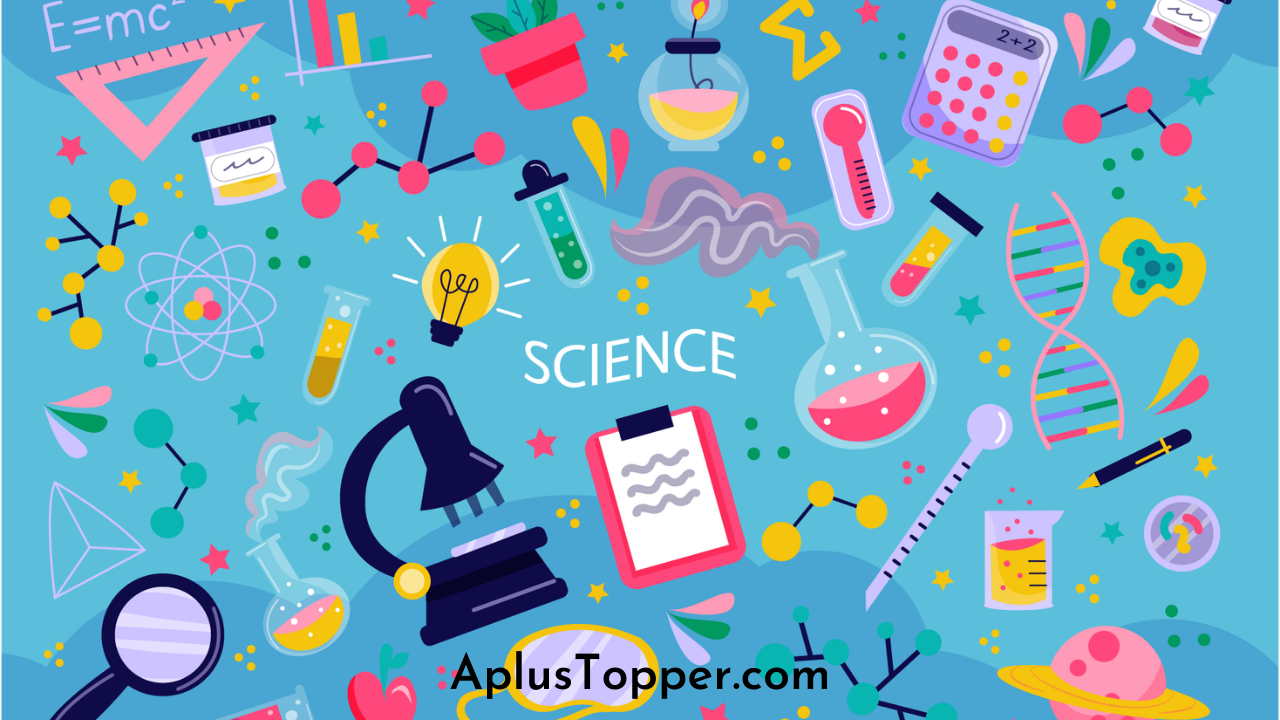General Science Terms: Philosopher William Whewell gave science its name. Science is the application of gathering knowledge and then understanding the natural phenomenon based on evidence. There are three general subjects of science:physics, chemistry, and biology. We will discuss some of the general terms used in these three subjects. We will also discuss some common science terms you will use while preparing the project plant, i.e. blueprint. But before that, let’s learn why it is essential to learn general science terms.
Importance Of General Science Terms
General science terms are the terms we use in our daily lives apart from books, schools and hospitals. These terms have become an integral part of our lives. For example:after the pandemic, words like RT-PCR test, oximeter, chest congestion, infection, etc., have become common. Hence, the need of the hour is we learn some of the common science terms that can help us anywhere in the future.
General Science Terms Used for Preparing A Blueprint
Suppose if you are asked to complete the science project with control and variables. The following terms are the basic information for any experiment you’ll perform.
- Control:the element which doesn’t change in an experiment. The control factor is used to dictate how much a variable has changed in the experiment because control allows you to measure the changes.
- Data:the information which you collect for your experiment.
- Experiment:The test you perform so that you get an idea of whether your theory is correct or incorrect.
- Hypothesis:after observing an experiment, the data you write in your book. The easiest trick is to make a proper table for observation and give an accurate conclusion.
- Procedure:The steps followed by you in your experiment.
- Qualitative Observation:To describe in your own words the things you observed in your experiments.
- Quantitative observation:whatever you notice in your experiments, and you use the number to show them, in theory, is known as Quantitative Observation.
- Variable:the feature which can be controlled, changed, or measured in an experiment is a variable.
- Independent variable:if you are changing variables to test your theory, then the variable is independent.
- Dependent variable:if the change you are measuring is the same as the variable, then the variable is dependent.
General Science Terms Used In Biology
If you have started studying science in earlier classes, you must notice that everyone started it from biology. I think that it’s an easy and very simple subject to understand. Let’s discuss its few building blocks:
- Cell:The smallest part found in an organism
- Chlorophyll:chlorophyll is responsible for capturing the light and feeding the plants while photosynthesis is ongoing. Chlorophyll is a green colourant found in every plant.
- Enzymes:these are used as a catalyst in biological processes. Enzymes control the specific function of our body.
- Evolution:by the changes in the environment, species do modify it.
- Habitat:the natural home of living organisms.
- Invertebrate:it is a type of animal that doesn’t have any backbone. There are many examples of invertebrates:Protozoa, annelids (worms), arachnids (spider), molluscs, echinoderms, crustaceans, and many more insects.
- Mitochondria:The small parts of cells which convert glucose into energy.
- Natural Selection:the animals which possess less desirable characteristics for survival die easily. This process tries to explain how a species can evolve.
- Nucleus:the cells which contain chromosomes. It is called a brain of cells because it has genetic information and instructions with it.
- Organelles:every small part of a cell has a unique importance in its way and has a specific purpose. Examples of organelles are as follows:Mitochondria and nucleus.
- Pathogen; A representative Which causes disease.
- Photosynthesis:this is the process in which plants convert carbon dioxide and sugar into energy. Oxygen is the byproduct of photosynthesis.
- Respiration:To produce energy, respiration is used by organisms. Mainly respiration includes inhalation of oxygen and exhalation of carbon dioxide gas.
- Vertebrate:The animals which have a backbone in their body are known as vertebrates. Vertebrate animals are fish, birds, mammals, human beings, reptiles, and amphibians.
- Genetics:Genetics is a part of biology. As mainly one studies about reproduction and its Inherit characteristics.
- Allele:It is a form of the gene. Because of this, mainly genetic variance is observed. There are various alleles in genes, and they are located on the same gene in the same spot on each chromosome.
- Chromosomes:a DNA molecule that consists of instructions that are required when there is a building of a cell.
- Dominant trait:Dominant trait is a relationship between two different alleles in which one allele disguise the expression of another allele
- Gene:It is an inheritance unit.
- Genotype:It’s a makeup of an individual done genetically.
- Heredity:there is a transfer of characteristics from one generation to another.
- Heterozygous:It refers to a person who Carries genetic materials for both characteristics.
- Homozygous:It refers to a person who Carries only a single characteristic. Offspring will inherit said characteristics if the parent is homozygous.
- Mutation:it produces new and different characteristics.
- Reproduction:the process by which a new organism is produced.
- Zygote:zygote means a fertilized ovum.

General Science Terms Used In Chemistry
One of the interesting subjects to study for students. It’s a heavy topic so let’s discuss its terms too.
- Absolute zero:absolute zero means the lowest temperature, which is possible. All the molecular activities stop at this temperature.
- Acid:its value is lower than 7 on a PH scale. It turns blue litmus paper into red litmus paper. It is sour. It gives hydrogen ions in an aqueous solution. Examples of acids are Citrus fruit and Vinegar.
- Atomic number:it is several protons in an atom. This number is located on the head of elements in the periodic table.
- Atomic symbol:Atomic symbol is a letter representing each of the elements in a periodic table.
- Atomic weight:The average weight of an atom is known as Atomic Weight. It’s on the lower side of an element in a periodic table. However, note that every periodic table doesn’t show the same information.
- Base:its value is greater than 7 on a PH scale. It turns red litmus paper into blue litmus paper. In water, usually Base feels slippery. Examples of bases are lye, Tums, or milk of magnesia.
- Boiling point:at an exact temperature when a liquid turns into a vapour.
- Bond:A chemical link attraction between atoms.
- Catalyst:catalyst reduces the activation energy of a reaction.
- Electrons:negatively charged particles.
- Elements:The atoms that have the same atomic number are called elements.
- Evaporation:when a substance changes from liquid to gas.
- Freezing point:the temperature at which liquid turns into a solid is called a freezing point.
- Mass:the measurement of matter in a body.
- Molecule:it is the smallest part of something, and it keeps the chemical properties of the whole.
- Neutrons:its mass is somewhere equal to protons. But it’s a chargeless particle.
- Nucleus:it contains both protons and neutrons.
- Protons:it is a positively charged particle.
- Salt:it is used for neutralizing the acid-base reaction.
- Temperature:it is a comparison of two bodies in terms of which is the most host.
General Science Terms for Physics
Physics is known as the king of science. It is also a branch of science, and it deals with the daily activity in our day-to-day life. Students take it as a tough subject, but it seems as easy as scrolling your phone if you have an interest in it.
- Acceleration:The rate of change of velocity is known as acceleration.
- Density:the mass of an object decided by its volume.
- Electric current:in the conductor, the flowing of electrons is known as an electric current.
- Energy:energy is defined as one’s capacity to work.
- Fission:it is a division of the Nucleus and atoms into smaller parts.
- Force:the body accelerates in the direction of applied force.
- Friction:measurements Of resistance when one body slides over another body.
- Inertia:it’s one of Newton’s laws. It states that if a body is in motion, it should continuously be in motion. And if a body is at rest, it must stay at rest until and unless an external force is applied.
- Kinetic energy:a body that is moving can be called as it has kinetic energy with it.
- Lens:light is modified by the lens. A convex lens focuses light, while a concave lens diffuses light.
- Light:it is a visible part of the electromagnetic spectrum.
- Stress:it is a measure of a force acting on a body.
- Torque:the capability of a body to move under an applied force.
- Weight:the gravitational force exerted on a mass.
- Velocity:it is a rate of change of distance concerning time.
If one needs a simple definition for science, then it is the study of nature and behaviour of natural things, and it’s all about understanding, observing. Science is one of the best and most enjoyable subjects one can ever get to learn. Well, this is all the information regarding General Science Terms one can provide. Hope you guys found it informative and helpful.k
